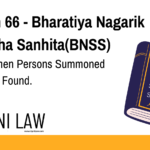Section 476 CrPC: Forms & Procedures – Code of Criminal Procedure
1. State the code
Section 476 of the Code of Criminal Procedure (CrPC) deals with the powers of a Magistrate to take cognizance of offences on the basis of a complaint from a court or tribunal.
2. Explain it
This section empowers a Magistrate to initiate criminal proceedings if a court or tribunal finds that a person has committed an offence while conducting its proceedings. This typically arises when there is evidence suggesting perjury, fabrication of evidence, or other criminal acts committed during the course of a legal process.
Here’s a breakdown:
- Court or Tribunal: This refers to any court or tribunal established by law.
- Cognizance: This means taking note of an offence and initiating an investigation.
- Complaint: A written statement by the court or tribunal detailing the alleged offence.
- Magistrate: The designated judicial officer who has the authority to take cognizance of the complaint.
3. Illustrate it
Imagine a civil case where a witness is found to have lied under oath. The court, recognizing this as perjury, can send a complaint to the Magistrate under Section 476 CrPC. The Magistrate then examines the complaint and can proceed to investigate the perjury case.
4. Common Questions and Answers
- Q: What happens after a Magistrate takes cognizance?
A: The Magistrate will investigate the matter and, if enough evidence is found, proceed with the trial against the accused person. - Q: Can a Magistrate refuse to take cognizance?
A: Yes, if the Magistrate finds that the complaint is frivolous or lacks sufficient evidence, they can refuse to take cognizance. - Q: What are the implications of an offence under Section 476 CrPC?
A: Depending on the nature of the offence (e.g., perjury, fabricating evidence), the accused person could face various punishments, including imprisonment and fines.







